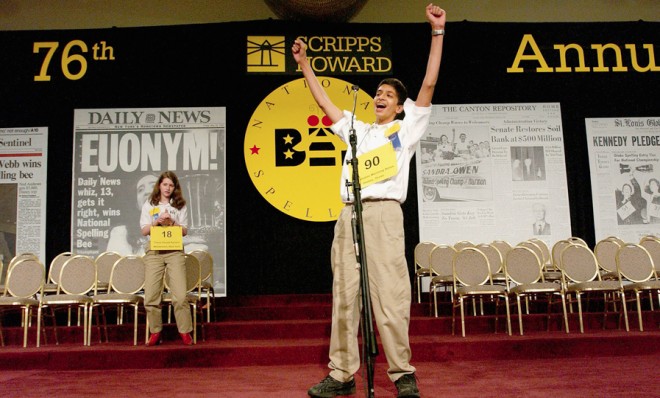17 winning words from past National Spelling Bees
Crustaceology, albumen, smaragdine, and more

A free daily email with the biggest news stories of the day – and the best features from TheWeek.com
You are now subscribed
Your newsletter sign-up was successful

On Thursday, Arvind Mahankali from New York spelled "knaidel" (a small mass of leavened dough) to win the Scripps National Spelling Bee. Here are 17 of the most interesting words from the Bee's 88-year history.
1. Gladiolus, 1925. The word (a type of flower) is notable not due to its complexity, but because it was the first-ever winning word.
2. Albumen, 1928. The white part of an egg.
The Week
Escape your echo chamber. Get the facts behind the news, plus analysis from multiple perspectives.

Sign up for The Week's Free Newsletters
From our morning news briefing to a weekly Good News Newsletter, get the best of The Week delivered directly to your inbox.
From our morning news briefing to a weekly Good News Newsletter, get the best of The Week delivered directly to your inbox.
3. Promiscuous, 1937. I just like the idea of an eight-year-old asking the judges to use it in a sentence.
4. Crustaceology, 1955. The study of crustaceans, of course. Doesn't it roll off of the tongue nicely?
5. Syllepsis, 1958. This is a complicated definition: "A figure of speech in which one word simultaneously modifies two or more other words such that the modification must be understood differently with respect to each modified word." Say what? How about an example from Dorothy Parker: "It's a small apartment. I've barely enough room to lay my hat and a few friends." There's also the Rolling Stones' "Honky Tonk Woman": "She blew my nose and then she blew my mind."
6. Smaragdine, 1961. Of or pertaining to emeralds, or having the color of emeralds. "What beautiful smaragdine eyes you have."
A free daily email with the biggest news stories of the day – and the best features from TheWeek.com
7. Esquamulose, 1962. Not covered in scales or scale-like objects. Can we bring this one back? "Hey, Jessie. You're looking especially esquamulose today."
8. Maculature, 1979. Paper waste and printed materials not intended for reading, AKA junk mail. You might consider those five Oriental Trading catalogs you never signed up for maculature.
9. Elucubrate, 1980. To produce by long and intensive effort, especially in reference to literary work.
10. Odontalgia, 1986. The next time you have a sore tooth, impress your dentist by telling him you're suffering from odontalgia. It's just a fancy word for toothache.
11. Antediluvian, 1994. Ancient, antiquated or supremely dated. Have a friend who's hitting a milestone birthday soon? Up the ante by referring to them as "antediluvian" instead of the totally overdone "over the hill."
12. Vivisepulture, 1996. The act of burying someone alive. Famous people terrified of being buried alive (also known as taphephobia, another great spelling word): Hans Christian Andersen, George Washington and Frederic Chopin.
13. Euonym, 1997. A name well suited to a person, place or thing.
14. Chiaroscurist, 1998. Chiaroscuro is a style of monochromatic shading used in art, but I like it because it makes me think of Trogdor.
15. Succedaneum, 2001. A substitute or replacement for something else, especially in reference to medicine.
16. Prospicience, 2002. Foresight.
17. Pococurante, 2003. Apathetic or indifferent. Even though you're not studying for the SATs anymore, maybe you should be a little less pococurante about expanding your vocabulary.
More from Mental Floss...
-
 The ‘ravenous’ demand for Cornish minerals
The ‘ravenous’ demand for Cornish mineralsUnder the Radar Growing need for critical minerals to power tech has intensified ‘appetite’ for lithium, which could be a ‘huge boon’ for local economy
-
 Why are election experts taking Trump’s midterm threats seriously?
Why are election experts taking Trump’s midterm threats seriously?IN THE SPOTLIGHT As the president muses about polling place deployments and a centralized electoral system aimed at one-party control, lawmakers are taking this administration at its word
-
 ‘Restaurateurs have become millionaires’
‘Restaurateurs have become millionaires’Instant Opinion Opinion, comment and editorials of the day